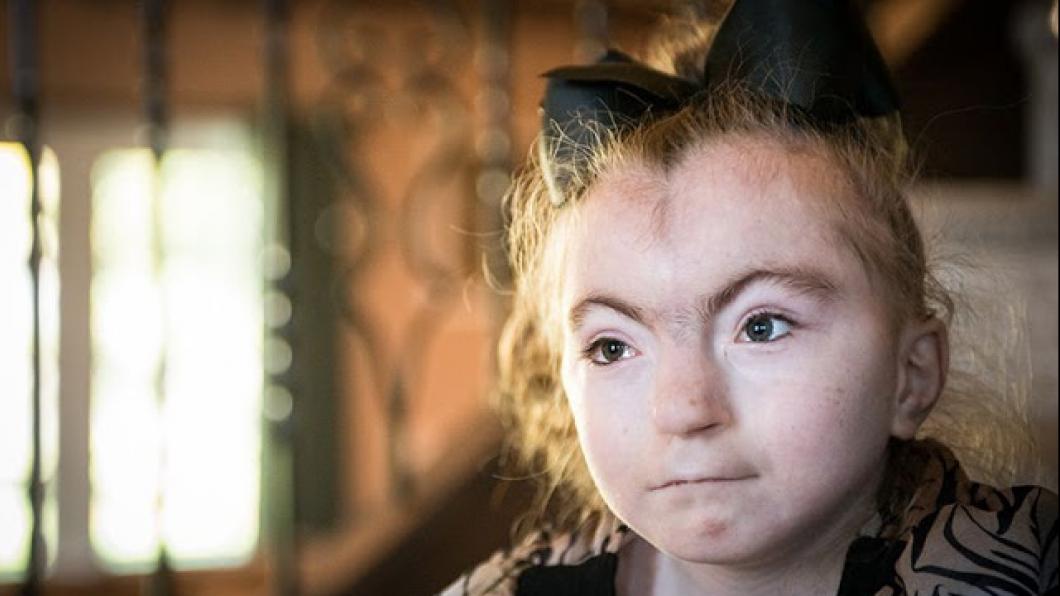
Why a new face-scanning genetics app worries me
Photo in Nature, by Michael Ares/The Palm Beach Post via ZUMA. This girl has Cornelia de Lange syndrome, a condition with distinct facial features that an app called Face2Gene was taught to identify and distinguish from other rare disorders.
By Louise Kinross
Yesterday, Nature reported on a paper in Nature Medicine about a smartphone app called Face2Gene that helps clinicians diagnose rare genetic conditions by analyzing photos of faces.
According to Nature, "it relies on machine-learning algorithms and brain-like neural networks to classify distinctive facial features in photos of people with congenital and neurodevelopmental disorders."
Not surprisingly, it's better at matching a face to a syndrome than clinical geneticists are.
"We failed miserably, and Face2Gene killed it," a geneticist is quoted saying. In fact, Nature used the header 'Killing it' above that section.
"Killing it" isn't quite the way to describe how it feels to be given a diagnosis of a rare genetic disorder in your newborn. For parents, it's not a game, or a sport, that you win.
If Face2Gene means families of children with the same rare syndrome will be better connected to share information and support, that would be invaluable. But I don't imagine the database serves that function.
I don't believe Face2Gene will necessarily lead to better treatments or therapies for rare disorders, and I wonder whether it will further stigmatize people with unusual faces.
To parents, there is something precious and sacred about a newborn's face. Gazing into our child's eyes is the first way parents connect with that new life.
When your child has unusual features, suddenly the face, instead of being a conduit to loving our child, becomes the focus of a great deal of negative attention from clinicians. All types of measurements of our baby's face and head may be taken and recorded, and we may be given a list of things that are "wrong."
When my son was four days old, a geneticist asked us to have the hospital photographer take photos of his face and profile, as well as his feet, which apparently were extra wrinkly. She said it would be useful to have photos on file to help doctors identify other kids like my son. As a new parent, it felt intrusive and stigmatizing.
Face2Gene has about 150,000 images in its database. Nature noted that these are mostly white faces, and the app only recognized Down syndrome in 37 per cent of black Congolese children. They plan to address this ethnic bias by appealing to doctors for photos of more diverse children and adults. As more photos are fed into the system, it will become more accurate. It sounds benign, but are there any negative implications?
In 2012 we reported on a French study in PLoS One that found photos of children with Down syndrome elicit less positive attitudes than photos of non-disabled children, particularly if the facial features are "strongly typical" of Down syndrome. Photos of children with Down syndrome were automatically associated with a negative trait, in implicit association tests, even in people who had openly rated them positively. "These implicit associations are the result of social values...carried by our culture, said lead investigator Claire Eneau Drapeau. "They are likely deeply embedded, and difficult to break."
How will Face2Gene influence public attitudes about children with facial differences linked to genetic conditions? I don't know the answer to that, but I think it's worth asking.
I remember going to the University of Toronto's medical library, and finding photos of children and adults with my son's condition. They were often naked, looked afraid, and had their eyes blacked out.
What will Face2Gene, and the clinicians who use it, do to promote the humanity and beauty of people with craniofacial syndromes?
A rare diagnosis is just the beginning of a long journey for a family. It's not a precise destination or answer or solution, in the way that the geneticist's words "killing it" imply. A wise pediatrician told me early on, before we knew my son's condition: "It probably won't change the therapies and treatments he receives."
At the time, I was naive. I thought that isolating the gene changes in my son's condition would lead to gene therapy or specific treatments. I even started an international association, with another mother, for families affected with the condition and we worked with researchers. At one point, cancer researchers were interested because one of the genes is a tumour suppressor.
I'm much more cynical and realistic now.
It sounds like Face2Gene is exciting for clinicians. I'm sure it gives them a sense of mastery in pinning down a diagnosis. I'm more interested in what happens next—to that child and family, and to how we, as a culture, view and treat people with genetically-based facial differences.